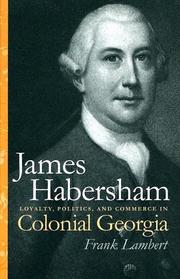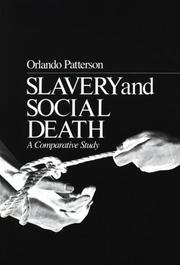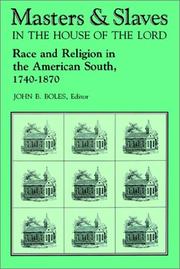| Listing 1 - 10 of 28 | << page >> |
Sort by
|

ISBN: 1280647817 9786613633866 0820343986 9780820343983 0820325392 9780820325392 9781280647819 Year: 2005 Publisher: Athens : University of Georgia Press,
Abstract | Keywords | Export | Availability | Bookmark
 Loading...
Loading...Choose an application
- Reference Manager
- EndNote
- RefWorks (Direct export to RefWorks)
James Habersham was an early American success story. After arriving in Savannah in 1738, he failed in his efforts to wrest a living from the Georgia wilderness and lived his first year at public expense. Then, by dint of his own efforts and through the connections he forged, Habersham emerged as one of the colony's most influential and prosperous citizens, making his name as a planter, merchant, evangelist, and political leader. The third wealthiest person in the colony at the time of his death in 1775, Habersham had a public career that included service as the secretary of Georgia, president of the King's council, and acting Governor. But Habersham's story is more than biography. It also provides a window into colonial Georgia and its transformation from a struggling colony on the brink of collapse in the 1740s to a prosperous province in the 1770s, confident enough to defy the Crown. Ranging over such topics as the rise of Methodist missionary fervor, the development of transatlantic trade, the introduction of slavery, and the escalating debate over American independence, Frank Lambert tells how Habersham's success is inextricably tied to Georgia's fortunes and how he played a major role in helping the colony exploit its abundant resources. Habersham's economic development plan provided a blueprint for attracting new settlers, supplying an abundance of cheap labor, and opening new markets. Habersham's achievements, however, are obscured by his unpopular stance on American independence. While his three sons distinguished themselves as Patriots, Habersham remained loyal to the Crown, though he had opposed Britain's new imperial policies in the 1760's. Nevertheless, it was Habersham's loyal service to colonial Georgia that enabled the colony to separate successfully from the mother country and assume its place in the new republic as a prosperous, vigorous state.
Slaveholders --- Merchants --- Politicians --- Slave holders --- Slave masters --- Slave owners --- Slavemasters --- Slaveowners --- Persons --- Plantation owners --- Slavery --- Statesmen --- Businesspeople --- Habersham, James, --- Georgia --- History --- Habersham, --- Commerce --- Enslavers
Book
ISBN: 146964097X 1469640988 9781469640983 9781469640976 9781469640952 1469640953 9781469640969 1469640961 9798890854292 Year: 2018 Publisher: Chapel Hill : Baltimore, Md. : University of North Carolina Press, Project MUSE,
Abstract | Keywords | Export | Availability | Bookmark
 Loading...
Loading...Choose an application
- Reference Manager
- EndNote
- RefWorks (Direct export to RefWorks)
Delving into wartime diaries kept by women of the southern slave-owning class, Steven Stowe recaptures their motivations to keep the days close even as war tore apart the brutal system of slavery that had benefited them. In studying the inner lives of these unsympathetic characters, Stowe also explores the importance - and the limits - of historical empathy as a condition for knowing the past.
Slaveholders --- Women, White --- White women --- Slave holders --- Slave masters --- Slave owners --- Slavemasters --- Slaveowners --- Persons --- Plantation owners --- Slavery --- Diaries. --- United States --- History --- Historiography. --- Women. --- Enslavers
Book
ISBN: 1316496449 1316496775 1316497100 1316497437 1316498751 1316498425 1316225488 1107105277 1107512565 1316494462 9781316225486 9781316498750 9781316497432 9781316498422 9781316497104 9781107512566 9781316496442 9781316496770 9781107105270 Year: 2016 Publisher: Cambridge Cambridge University Press
Abstract | Keywords | Export | Availability | Bookmark
 Loading...
Loading...Choose an application
- Reference Manager
- EndNote
- RefWorks (Direct export to RefWorks)
The traditional image of slavery begins with a master and a slave. However, not all slaves had traditional masters; some were owned instead by institutions, such as church congregations, schools, colleges, and businesses. This practice was pervasive in early Virginia; its educational, religious, and philanthropic institutions were literally built on the backs of slaves. Virginia's first industrial economy was also developed with the skilled labor of African American slaves. This book focuses on institutional slavery in Virginia as it was practiced by the Anglican and Presbyterian churches, free schools, and four universities: the College of William and Mary, Hampden-Sydney College, the University of Virginia, and Hollins College. It also examines the use of slave labor by businesses and the Commonwealth of Virginia in industrial endeavors. This is not only an account of how institutions used slavery to further their missions, but also of the slaves who belonged to institutions.
Slavery --- Slaveholders --- Abolition of slavery --- Antislavery --- Enslavement --- Mui tsai --- Ownership of slaves --- Servitude --- Slave keeping --- Slave system --- Slaveholding --- Thralldom --- Crimes against humanity --- Serfdom --- Slaves --- Slave holders --- Slave masters --- Slave owners --- Slavemasters --- Slaveowners --- Persons --- Plantation owners --- History. --- Enslavers --- Enslaved persons

ISBN: 0674810821 067481083X 9780674810822 9780674810839 Year: 1982 Publisher: Cambridge, Mass.: Harvard university press,
Abstract | Keywords | Export | Availability | Bookmark
 Loading...
Loading...Choose an application
- Reference Manager
- EndNote
- RefWorks (Direct export to RefWorks)
Antislavery --- Esclavage --- Mui tsai --- Ownership of slaves --- Servitude --- Slave keeping --- Slavernij --- Slavery --- Slaves --- Slaveholders --- Psychology --- #SBIB:39A6 --- #SBIB:93H3 --- Etniciteit / Migratiebeleid en -problemen --- Thematische geschiedenis --- Slavery. --- Psychology. --- Enslaved persons --- Persons --- Abolition of slavery --- Enslavement --- Slave system --- Slaveholding --- Thralldom --- Crimes against humanity --- Serfdom --- Slave holders --- Slave masters --- Slave owners --- Slavemasters --- Slaveowners --- Plantation owners --- Slaves - Psychology. --- Slaveholders - Psychology. --- Slaves - Psychology --- Slaveholders - Psychology --- Enslavers
Book
ISBN: 0773411208 9780773411203 9780773435285 077343528X Year: 2009 Publisher: Lewiston : The Edwin Mellen Press,
Abstract | Keywords | Export | Availability | Bookmark
 Loading...
Loading...Choose an application
- Reference Manager
- EndNote
- RefWorks (Direct export to RefWorks)
This book reconstructs the conviction of a slave girl found guilty of beating and burning to death her owner, the man who fathered her three children. The political climate of pre-Civil War Missouri did not favor justice for an enslaved girl who confessed to murdering her owner, even though those acquainted with the case believed she could not have committed the deed.
Missouri -- History -- 19th century -- Fiction. --- Slaveholders -- Crimes against -- Fiction. --- Women slaves -- Missouri -- Fiction. --- Women slaves --- Slaveholders --- Slave holders --- Slave masters --- Slave owners --- Slavemasters --- Slaveowners --- Persons --- Plantation owners --- Slavery --- Slave women --- Slaves --- Crimes against --- Missouri --- History --- Enslavers --- Women, Enslaved --- Enslaved persons --- Enslaved women
Book
ISBN: 152610301X 1781707898 9781781707890 9781526103017 0719091837 9780719091834 1526103028 Year: 2017 Publisher: Baltimore, Maryland : Baltimore, Md. : Project Muse, Project MUSE,
Abstract | Keywords | Export | Availability | Bookmark
 Loading...
Loading...Choose an application
- Reference Manager
- EndNote
- RefWorks (Direct export to RefWorks)
Slavery and the slavery business have cast a long shadow over British history. In 1833, abolition was heralded as evidence of Britain's claim to be the modern global power. Yet much is still unknown about the significance of the slavery business and emancipation in the formation of modern imperial Britain. This book engages with current work exploring the importance of slavery and slave-ownership in the re-making of the British imperial world after abolition in 1833. The contributors to this collection, drawn from Britain, the Caribbean and Mauritius, include some of the most distinguished writers in the field: Clare Anderson, Robin Blackburn, Heather Cateau, Mary Chamberlain, Chris Evans, Pat Hudson, Richard Huzzey, Zo{uml}e Laidlaw, Alison Light, Anita Rupprecht, Verene A. Shepherd, Andrea Stuart and Vijaya Teelock. The impact of slavery and slave-ownership is once again becoming a major area of historical and contemporary concern: this book makes a vital contribution to the subject.
Slavery --- Slaveholders --- Slaves --- Slave holders --- Slave masters --- Slave owners --- Slavemasters --- Slaveowners --- Persons --- Plantation owners --- Abolition of slavery --- Antislavery --- Enslavement --- Mui tsai --- Ownership of slaves --- Servitude --- Slave keeping --- Slave system --- Slaveholding --- Thralldom --- Crimes against humanity --- Serfdom --- Enslaved persons --- History --- Emancipation --- Economic aspects --- Colonies --- Enslavers --- British Empire. --- Caribbean. --- Imperialism. --- Mauritius. --- Slave-ownership. --- Slavery.
Book
ISBN: 1613766165 9781613766170 1613766173 9781613766163 9781625343697 1625343698 9781625343703 Year: 2018 Publisher: Amherst : University of Massachusetts Press,
Abstract | Keywords | Export | Availability | Bookmark
 Loading...
Loading...Choose an application
- Reference Manager
- EndNote
- RefWorks (Direct export to RefWorks)
"William Hardin Burnley (1780-1850) was the largest slave owner in Trinidad during the nineteenth century. Born in the United States to English parents, he settled on the island in 1802 and became one of its most influential citizens and a prominent agent of the British Empire. A central figure among elite and moneyed transnational slave owners, Burnley moved easily through the Atlantic world of the Caribbean, the United States, Great Britain, and Europe, and counted among his friends Alexis de Tocqueville, British politician Joseph Hume, and prime minister William Gladstone. In this first full-length biography of Burnley, Selwyn R. Cudjoe chronicles the life of Trinidad's "founding father" and sketches the social and cultural milieu in which he lived. Reexamining the decades of transition from slavery to freedom through the lens of Burnley's life, The Slave Master of Trinidad demonstrates that the legacies of slavery persisted in the new post-emancipation society"--
Slavery --- Slaveholders --- Abolition of slavery --- Antislavery --- Enslavement --- Mui tsai --- Ownership of slaves --- Servitude --- Slave keeping --- Slave system --- Slaveholding --- Thralldom --- Crimes against humanity --- Serfdom --- Slaves --- Slave holders --- Slave masters --- Slave owners --- Slavemasters --- Slaveowners --- Persons --- Plantation owners --- History --- Burnley, William Hardin, --- Enslavers --- Enslaved persons --- SOCIAL SCIENCE / Anthropology / Cultural. --- Slavery.

ISBN: 9780813148793 0813148790 0813101875 Year: 1988 Publisher: Lexington, Kentucky : University Press of Kentucky,
Abstract | Keywords | Export | Availability | Bookmark
 Loading...
Loading...Choose an application
- Reference Manager
- EndNote
- RefWorks (Direct export to RefWorks)
Much that is commonly accepted about slavery and religion in the Old South is challenged in this significant book. The eight essays included here show that throughout the antebellum period, southern whites and blacks worshipped together, heard the same sermons, took communion and were baptized together, were subject to the same church discipline, and were buried in the same cemeteries. What was the black perception of white-controlled religious ceremonies? How did whites reconcile their faith with their racism? Why did freedmen, as soon as possible after the Civil War, withdraw from the biraci
Slaveholders --- Slaves --- Slavery --- Slavery and the church --- Slave holders --- Slave masters --- Slave owners --- Slavemasters --- Slaveowners --- Persons --- Plantation owners --- Enslaved persons --- Church and slavery --- Church --- Religious life. --- History. --- Southern States --- American South --- American Southeast --- Dixie (U.S. : Region) --- Former Confederate States --- South, The --- Southeast (U.S.) --- Southeast United States --- Southeastern States --- Southern United States --- United States, Southern --- Race relations. --- Church history --- Enslavers --- Religious life
Book
ISBN: 1316056503 1316054144 1316082512 1316635260 1316080153 1316070697 1139626957 1316075419 131607305X 1316077780 1107040051 1322176841 Year: 2014 Publisher: Cambridge : Cambridge University Press,
Abstract | Keywords | Export | Availability | Bookmark
 Loading...
Loading...Choose an application
- Reference Manager
- EndNote
- RefWorks (Direct export to RefWorks)
This book re-examines the relationship between Britain and colonial slavery in a crucial period in the birth of modern Britain. Drawing on a comprehensive analysis of British slave-owners and mortgagees who received compensation from the state for the end of slavery, and tracing their trajectories in British life, the volume explores the commercial, political, cultural, social, intellectual, physical and imperial legacies of slave-ownership. It transcends conventional divisions in history-writing to provide an integrated account of one powerful way in which Empire came home to Victorian Britain, and to reassess narratives of West Indian 'decline'. It will be of value to scholars not only of British economic and social history, but also of the histories of the Atlantic world, of the Caribbean and of slavery, as well as to those concerned with the evolution of ideas of race and difference and with the relationship between past and present.
Slaveholders --- Slavery --- Abolition of slavery --- Antislavery --- Enslavement --- Mui tsai --- Ownership of slaves --- Servitude --- Slave keeping --- Slave system --- Slaveholding --- Thralldom --- Crimes against humanity --- Serfdom --- Slaves --- Slave holders --- Slave masters --- Slave owners --- Slavemasters --- Slaveowners --- Persons --- Plantation owners --- History --- Colonies --- Great Britain --- Enslaved persons --- Enslavers
Book
ISBN: 0253026024 0253025974 0253025990 9780253026026 9780253025975 9780253025999 Year: 2017 Publisher: Bloomington, Indianapolis, Indiana : Indiana University Press,
Abstract | Keywords | Export | Availability | Bookmark
 Loading...
Loading...Choose an application
- Reference Manager
- EndNote
- RefWorks (Direct export to RefWorks)
Knowing why these individuals and so many others in West Africa made the decisions they did, Greene contends, is critical to understanding how and why the institution of indigenous slavery continues to influence social relations in West Africa to this day.
Slaveholders --- Slaves --- Slavery --- Emancipation --- History --- Africa, West --- Social conditions --- Abolition of slavery --- Antislavery --- Enslavement --- Mui tsai --- Ownership of slaves --- Servitude --- Slave keeping --- Slave system --- Slaveholding --- Thralldom --- Crimes against humanity --- Serfdom --- Enslaved persons --- Persons --- Slave holders --- Slave masters --- Slave owners --- Slavemasters --- Slaveowners --- Plantation owners --- Africa, Western --- West Africa --- Western Africa --- Enslavers
| Listing 1 - 10 of 28 | << page >> |
Sort by
|

 Search
Search Feedback
Feedback About UniCat
About UniCat  Help
Help News
News